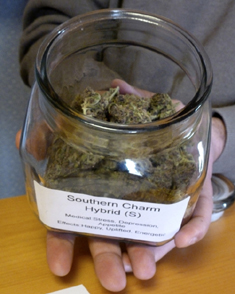Uncertainty about marijuana’s status casts doubt on dispensary underwriting

Public radio stations are divided over whether to accept underwriting donations from what could be an up-and-coming source of income: marijuana dispensaries.
Twenty states and the District of Columbia have legalized medical marijuana, and last year residents of Colorado and Washington state went further and legalized recreational use of cannabis. As dispensaries seek to build clienteles, they’re turning to public radio sponsorships to raise awareness, prompting stations to consider the possible pros and cons of airing the spots. But the haze surrounding marijuana’s legalization has prompted some stations to just say “no.”
Possession of marijuana remains illegal under federal law, and the Drug Enforcement Administration has continued to raid dispensaries. That has prompted some public radio stations to keep their distance.

David Niccum, general manager of the marijuana dispensary that placed underwriting on KBUT, says the sponsorship helped the three-year-old business gain legitimacy in the community. (Photo: Samantha Wright/Watch Newspapers)
Others are open to the prospect of making underwriting deals with dispensaries, including KVNF in Paonia, Colo., where staffers are weighing the decision. Last month, Underwriting Director Amber McDaniel asked for advice from fellow public radio development staffers via an email forum, and she got an earful, both yay and nay.
Most of the pro-dispensary staffers chose to email her privately, she noted. “There’s still a lot of paranoia about it,” she told Current.
McDaniel’s station first considered the issue a few years ago, when only medical marijuana was legal in Colorado. Three dispensaries had approached the station about buying underwriting, and the board decided to turn them away.
But the issue came up again recently when a KVNF DJ told McDaniel that an “alternative healing center” in Ridgeway, Colo., was interested in donating in exchange for underwriting. McDaniel didn’t realize that the center is actually a dispensary until she researched the business.
When Acme Healing Center opened three years ago, other businesses were reluctant to associate with it, said David Niccum, Acme’s general manager. Its first official promotion in any media outlet was on KBUT, a public radio station in Crested Butte, Colo. In a perhaps unexpected example of public radio’s “halo effect” working its magic, the spots lent the fledgling dispensary some legitimacy and “opened doors,” Niccum said.
“People are more comfortable when they hear we’re on a community radio station,” Niccum said. The KBUT underwriting credits prompted a local dance collective to approach Acme as a sponsor as well, he said.
“We hope that we’re a positive influence on advertising and the media,” Niccum said. “And we’d like to continue working toward that and getting more public.”
Acme and other dispensaries may face an uphill battle. KBUT General Manager Eileen Hughes declined to even confirm to Current whether the station carried underwriting from dispensaries. Yet while listening to KBUT’s live broadcast while on hold in the station’s phone system, a reporter heard an announcer read a spot for Boom Town, another dispensary in Crested Butte.
So far, FCC keeping mum
Other stations that have fielded requests from dispensaries have definitively turned down the offers. In Seattle, where medical marijuana has been legal since 1998, KUOW has heard from about half a dozen dispensaries. But due to federal law, the station has declined to accept the underwriting, said John Hill, director of corporate support.
The FCC has not made any decisions on the issue, according to John Crigler, a communications attorney at Garvey Schubert Barer in Washington, D.C. And the commission is unlikely to wade into the matter as long as federal and state governments remain at odds, he said.
Most commercial broadcast stations have steered clear of selling advertising to dispensaries, Crigler said, because promotion of illegal activity does not qualify as protected speech. But FCC guidelines for noncommercial stations are fuzzier. An underwriting credit is not technically promotional, but is an acknowledgment of receipt of a donation, “and there’s nothing that would prohibit a station from accepting a contribution” from a legal business such as a dispensary, Crigler said.
While it’s possible that an offended listener could file a complaint with the FCC, the commission has a track record of delaying indefinitely its response to some complaints, Crigler said.
“I don’t think anyone can give an up-or-down, black-or-white answer” about whether stations should accept underwriting dollars from dispensaries, Crigler said. “It’s a risk assessment rather than a question of right or wrong.”
Meanwhile, KVNF’s McDaniel and her colleagues have yet to reach a decision. The board is waiting to take up the issue until a new general manager is installed at the station.
McDaniel acknowledged that she personally would support accepting the underwriting but pointed out that she’s relatively new at the station—she started in March—and she’s 29 years old, younger than some other stakeholders in the issue.
She doesn’t want to alienate any listeners, “but it’s not as if nobody smokes anymore,” she said. “It’s very common these days.”







We have to wait for pot to be legal in the federal level for it to work. I know KALW in San Francisco has pot updates on the Crosscurrents section.
[…] by Mike JanssenAug. 16, 2013 Public radio stations are divided over whether to accept underwriting donations from what could be an up-and-coming source of income: marijuana dispensaries. Twenty states and the District of Columbia have legalized medical marijuana, and last year residents of Colorado and Washington state went further and legalized recreational use of cannabis. As dispensaries seek to build clienteles, they’re turning to public radio sponsorships to raise awareness, prompting stations to consider the possible pros and cons of airing the spots. But the haze surrounding marijuana’s legalization has prompted some stations to just say “no.” Possession of marijuana remains illegal under federal law, and the Drug Enforcement Administration has continued to raid dispensaries. That has prompted some public radio stations to keep their distance. Others are open to the prospect of making underwriting deals with dispensaries, including KVNF in Paonia, Colo., where staffers are weighing the decision. Last month, Underwriting Director Amber McDaniel asked for advice from fellow public radio development staffers via an email forum, and she got an earful, both yay and nay. Most of the pro-dispensary staffers chose to email her privately, she noted. “There’s still a lot of paranoia about it,” she told Current.McDaniel’s station first considered the issue a few years ago, when only medical marijuana was legal in Colorado. Three dispensaries had approached the station about buying underwriting, and the board decided to turn them away. But the issue came up again recently when a KVNF DJ told McDaniel that an “alternative healing center” in Ridgeway, Colo., was interested in donating in exchange for underwriting. McDaniel didn’t realize that the center is actually a dispensary until she researched the business. When Acme Healing Center opened three years ago, other businesses were reluctant to associate with it, said David Niccum, Acme’s general manager. Its first official promotion in any media outlet was on KBUT, a public radio station in Crested Butte, Colo. In a perhaps unexpected example of public radio’s “halo effect” working its magic, the spots lent the fledgling dispensary some legitimacy and “opened doors,” Niccum said. “People are more comfortable when they hear we’re on a community radio station,” Niccum said. The KBUT underwriting credits prompted a local dance collective to approach Acme as a sponsor as well, he said. “We hope that we’re a positive influence on advertising and the media,” Niccum said. “And we’d like to continue working toward that and getting more public.” See complete article at: http://www.current.org/2013/08/uncertainty-about-marijuanas-status-casts-doubt-on-dispensary-underwriting/#sthash.7gCPk6ST.dpuf […]